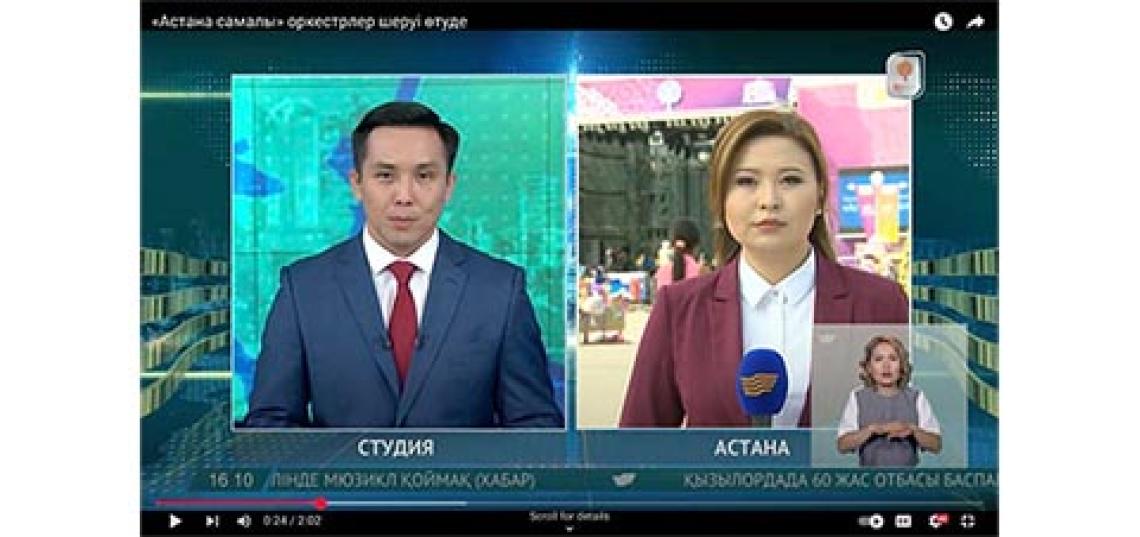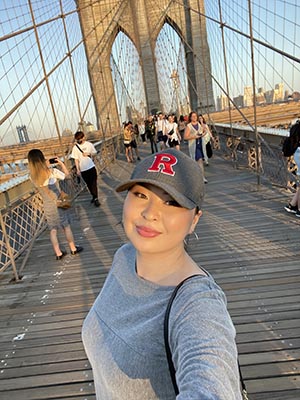
For Gulzira Omarova MCM'22, a public relations strategist from Kazakhstan, Central Asia, communication is far more than press releases or publicity. It’s about building credibility, shaping culture, and setting ethical standards for how organizations engage with the public.
Before enrolling in Rutgers University’s Master of Communication and Media (MCM) program at the School of Communication and Information (SC&I), Omarova had already established herself as a prominent figure in the region’s PR and media industry. Her early career included leading communication projects for Astana EXPO-2017 and the Ministry of Justice of Kazakhstan, as well as hosting and producing her own television program on one of the country’s national TV networks.
“Coming from journalism, I was always passionate about storytelling,” Omarova recalls. “But I wanted to move beyond just reporting stories – I wanted to help organizations shape them responsibly.”
“Rutgers changed how I think about communication,” Omarova says. “The courses such as Crisis Communication, Reputation Management, and PR Strategy gave me a solid theoretical framework that I had been missing. In our region, PR education is still developing, and information often isn’t updated. At Rutgers, I received a modern, research-based foundation that transformed my practical skills into strategic expertise.”
Bringing Global Standards to Central Asia
Throughout her early career, Omarova became increasingly aware of the need to introduce international PR standards and communication ethics to the Central Asian region. She advocated for recognizing public relations as a strategic management discipline–distinct from marketing, advertising, or simple media outreach.
“In Kazakhstan, PR was often seen as publicity or media placement,” she explains. “I wanted to change that. My mission was to show that real PR is about long-term relationships, reputation management, and public trust.”
Her commitment to professionalizing the field led her to Rutgers, where she sought a deeper academic foundation to complement her extensive hands-on experience.
The Rutgers Experience: Building a Strategic Foundation
At Rutgers, Omarova found exactly what she was looking for – a program that combined theory, strategy, and global perspective.
“Rutgers changed how I think about communication,” she says. “The courses such as Crisis Communication, Reputation Management, and PR Strategy gave me a solid theoretical framework that I had been missing. In our region, PR education is still developing, and information often isn’t updated. At Rutgers, I received a modern, research-based foundation that transformed my practical skills into strategic expertise.”
 These courses also deepened her understanding of ethics - a value she now champions in every aspect of her professional work. “Communication Ethics was one of the courses that truly shaped my philosophy,” she says. “It made me realize that PR without ethics is not sustainable. Credibility is everything.”
These courses also deepened her understanding of ethics - a value she now champions in every aspect of her professional work. “Communication Ethics was one of the courses that truly shaped my philosophy,” she says. “It made me realize that PR without ethics is not sustainable. Credibility is everything.”
Educating the Next Generation of Communicators
After completing her degree, Omarova started actively sharing what she had learned. She founded the first online PR Academy for Journalists of Central Asia, helping media professionals transition into public relations with a strategic and ethical mindset.
“In Kazakhstan, it’s common for journalists to move into PR,” she explains. “But many don’t receive formal training in strategic communication. It’s like athletes becoming coaches - they need new skills, new frameworks. That’s why I created the PR Academy: to help them make that transition the right way.”
Through the academy, Omarova has trained dozens of professionals to understand the difference between publicity and public relations, emphasizing stakeholder communication, transparency, and long-term reputation building. Her workshops and programs are now recognized across the region as leading examples of PR education reform.
Auditing Reputations, Building Trust
In addition to her educational initiatives, Omarova continues to lead PR, brand, and communication audits for major Kazakhstani companies and public figures. These audits evaluate how organizations manage public perception, identify communication gaps, and realign strategies with global best practices.
“Every audit is an opportunity to raise the standard of communication in our region,” Omarova says. “I assess not just messaging, but whether companies are communicating with integrity and authenticity. The values that I strengthened through my Rutgers education.”
Through the academy she founded, Omarova has trained dozens of professionals to understand the difference between publicity and public relations, emphasizing stakeholder communication, transparency, and long-term reputation building. Her workshops and programs are now recognized across the region as leading examples of PR education reform.
Her work bridges cultural and professional worlds, helping clients align with international frameworks while respecting Central Asian traditions and nuances. “I see myself as a bridge between East and West,” she says. “Rutgers gave me the global perspective I needed to connect these two worlds.”
A Lifelong Mission of Ethical Communication
Omarova’s contributions extend beyond consultancy and education. She regularly publishes articles on communication ethics, international PR standards, and media professionalism across the Central Asian and post-Soviet space. Her interviews for media and writings have sparked national discussions about the evolving role of PR.
“I want young professionals to see PR not as press coverage, but as a tool for dialogue, credibility, and societal trust,” she says. “That’s what I learned at Rutgers and that’s what I teach now.”
Looking ahead, Omarova plans to expand her research and develop new educational content focused on AI-driven communications and ethical storytelling - continuing to merge innovation with integrity.
Learn more about the Master of Communication and Media program on the Rutgers School of Communication and Information website.
Photos: Courtesy of Gulzira Omarova MCM'22
